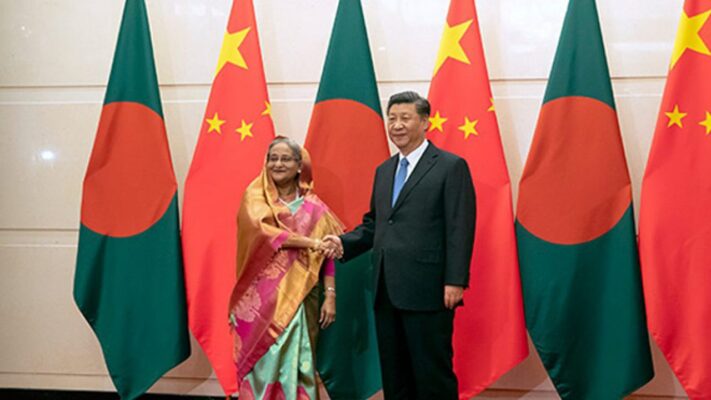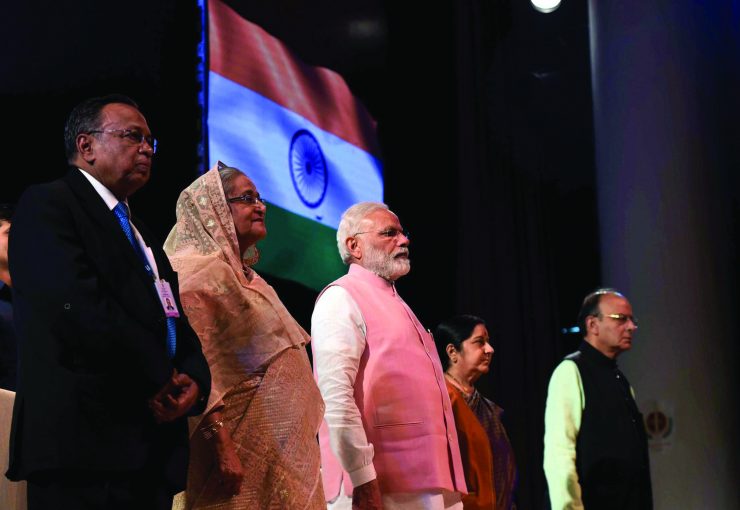
China which considers India as nascent challenger in the region slowly but steadily trying to win over latter’s neighbours. Pakistan which already lost Gwadar seaport, and is in the grip of China published a map one day before the first anniversary of the defanging of article 370. The political map included Jammu and Kashmir (J&K) as part of Pakistan.
Nepal also on the behest of China issued a map in which Indian areas including Limpiadhura, Lipulek and Kalapani were shown as part of Nepal. The critics mention that Rajapaksa government of Sri Lanka is pro-China and several important projects are going to Chinese companies.
Beijing assessed that at present the relations between Dhaka and New Delhi have deteriorated as Bangladesh government is against India’s National Register of Citizens (NRC) and The Citizenship (Amendment) Act, 2019 which gives eligibility for Indian citizenship to illegal migrants belong to the communities of Hindus, Sikhs, Buddhists, Jains, Parsis and Christians from Afghanistan, Bangladesh and Pakistan but excludes Muslims.
Dhaka feels that Indian security agencies will push the illegal Bangladeshis in the country and in future unemployed Bangladeshis will not able to infiltrate in India. Sheikh Hasina had also not given time to meet Indian High Commissioner in Dhaka for about four months.
Chinese companies successfully acquired important projects including development of a smart city near Dhaka and construction of airport in Sylhet, a city in eastern Bangladesh. Recently China agreed to fund projects of more than US$6 billion while it was already working on the infrastructure projects worth US$10 billion.
The defence relations between China and Bangladesh are also enhancing these days. Beijing is supplying tanks, fighter jets, submarines, frigates and other equipment to Bangladesh. Both the countries have signed a Defence Cooperation Agreement in 2002.
In a calculated move to win over Bangladesh, China exempted 97 per cent of Bangladesh exports from duty. Chinese President Xi Jinping granted this concession during a telephonic conversation with Prime Minister Sheikh Hasina. Now 8,256 Bangladeshi articles have become duty-free.
In 2016 when Xi Jinping visited Bangladesh, he promised an investment of US$25 billion. In 2019 Bangladesh also awarded contract to a Chinese firm to construct renewable energy projects which can produce 500 megawatts of power by 2023.
China is also assisting Bangladesh as it is an important country for the success of Belt and Road Initiative (BRI), which is a leading project of Xi Jinping. According to a rough estimate, China promised investments worth US$38 billion under BRI related projects in Bangladesh.
The Indian security agencies are of the view that once China gets stronghold in Bangladesh, Chinese intelligence agency Ministry of State Security (MSS) will also involve Pakistan’s Inter Services Intelligence (ISI).
It may be noted here that the sinister ISI since beginning has used East Pakistan and later Bangladesh for fomenting trouble in India. There are reports that in the past Pakistan had terrorist training camps in Bangladesh where it was training insurgents of diverse terrorist outfits from the north eastern states of India.
Pakistan Prime Minister Imran Khan called Sheikh Hasina in July 2020 and desired to have cordial relations between both the countries. Pakistani High Commissioner in Bangladesh also met Abul Kalam Abdul Momen, Bangladeshi Minister of Foreign Affairs, just before Imran Khan called Sheikh Hasina. Pakistani High Commissioner also pleaded for stronger relations between both the countries on the basis of religion and culture.
Bangladesh claims that Indian implementation of projects is awfully slow, and it is an important reason that the neighbouring countries are leaning more towards China. Reliance Power and Adani Group declared construction of power projects, but they are still in initial stages. Projects like Akhaura-Agartala rail link, India-Bangladesh Friendship Pipeline, inland water ways all are extremely sluggish and behind schedule. Bangladesh-Bhutan-India-Nepal (BBIN) Motor Vehicles Agreement is also not rolling. The sharing of water of Teesta river is an antagonistic issue and is not resolved.

Now China has agreed for extensive dredging of Teesta river and its tributaries, building of dams, stopping of erosion and reclamation of land. Although Chinese project in Teesta river will not directly affect India but it will enhance Chinese image in Bangladesh as it will be a big engineering achievement. It will also indicate that several states in India are suffering from flood and water shortage and government is unable to take any action.
From Bangladesh side, Sheikh Hasina paid a visit to China in July 2019 where bilateral trade was the main agenda of the Bangladeshi PM’s visit. Several agreements were also signed during the visit. China also promised the loan of US$1.7 billion to improve power sector.
Chinese companies also adopt underhand techniques. Dhaka-Sylhet highway project which was worth US$1.6 billion was cancelled by Bangladesh authorities as the Chinese contractor tried to bribe the Bangladeshi officials. China Harbour Engineering Company (CHEC) which also constructed Hambantota Port in Sri Lanka was blacklisted by Bangladesh.
Analysts remark that Chinese companies oust the competitors from the market by using unjust ways. It is also mentioned that Chinese companies also obtain contracts through lower bids but later change the terms and conditions of the contract, out of which they charge more for spare parts.
After Pakistan, in South Asia, Bangladesh received maximum investments from China, nevertheless several analysts claim that Dhaka is falling in a Chinese debt trap. They give the example of Sri Lanka as it had to give Hambantota port on 99 years lease to China because of non-payment of loan.
Critics also mention that Myanmar uprooted Rohingya Muslims from the country by using Chinese weapons, and China is still supporting Myanmar militarily without understanding the problems Bangladesh is facing because of Rohingya refugees.
However, if we talk of the relations between India and Bangladesh, they are historically cordial. India extended three lines of credit for the development of infrastructure projects in railways, roads, shipping etc. New Delhi also gave 10 diesel locomotives to Dhaka recently.
Foreign Secretary Harsh Vardhan Shringla paid two successful visits to Dhaka. In the recent visit in August 2020 several bilateral issues were discussed including the cooperation over the Coronavirus vaccine. There is a good synergy between both the prime ministers, and Modi understands that cordial relation with Bangladesh is essential for the development of north eastern states.
Besides Bengali relationship, India should also cultivate Tamil and Telugu population in Bangladesh which is controlling the textile industry in the country. Medical tourism is also increasing, and Bangladeshi students are also coming to India for studies.
There is always a vast difference between the announcement of Chinese investment and the real amount invested by Beijing. On the other hand, India’s loan terms and conditions are much better and there is no difference between announcement and actual delivery.
India’s relations with its neighbours including Bangladesh, Sri Lanka, Bhutan and Maldives are quite cordial. Nepal has become difficult during the prime ministership of KP Sharma Oli, while India’s relations with Afghan government as well as with Taliban are quite cordial.
India is receiving overwhelming support from several countries including the United States, Australia, Japan, Vietnam, France, Russia and European Union during the hostilities with China. Few countries are vocal while some countries are supporting silently.
Bangladesh is aware of Chinese underhand practices and it will not embitter its relations with India. It may also be possible that Dhaka may try to extract some more favours from India to counter its closeness with Beijing. Few analysts also claim that Sheikh Hasina wants to encash anti-India sentiments in the country by showing closeness with China.
Bangladesh is a sovereign nation and has cordial relations with India and although it is accepting assistance from China in the development of infrastructure in the country, but it will not affect India Bangladesh relationship and Dhaka will not work against the interests of New Delhi.
-Jai Kumar Verma is a New Delhi-based strategic analyst and a retired senior intelligence officer. He is also a member of United Services Institute of India and Institute for Defence Studies and Analyses. The views in the article are solely of the author and do not necessarily reflect the views of Raksha Anirveda








